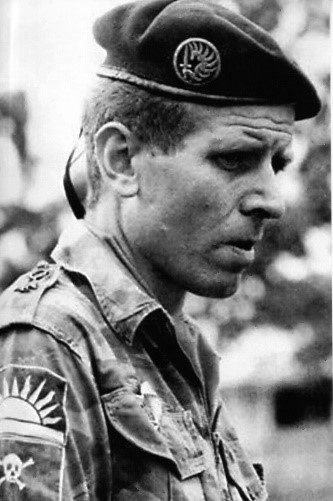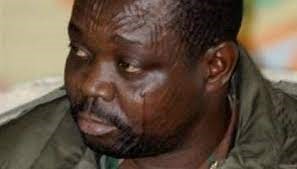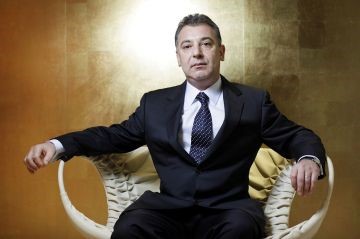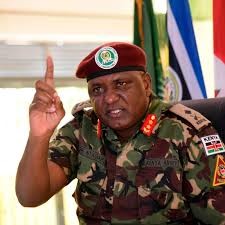Andrew McGregor
Jamestown Foundation, May 30, 2024
Congo Mercenary was Major “Mad Mike” Hoare’s account of 1960s mercenary action in the newly independent Republic of the Congo. His experience became the inspiration for movies like Dark of the Sun (1968) and The Wild Geese (1978) that forever linked White mercenaries and the Congo in the popular imagination. This era appeared to come to a close, however, with the 1971 Khartoum show-trial of German mercenary Rolf Steiner and the subsequent 1977 Organization of African Unity “Convention for the Elimination of Mercenarism in Africa” (Gabon, July 3, 1977) in which mercenaries were outlawed in Africa as preservers of “colonial and racist domination.”
Most of Hoare’s “Five Commando” were acclimated South Africans or former residents of European colonies. When President Mobutu Sese Seko (1965-1997) reached for the aid of White mercenaries during the First Congo War (1996-1997) he discovered he could hire Eastern Europeans without colonial baggage (but often veterans of the vicious Balkan wars) for less than the usual West European or White African mercenaries.
Mobutu thus hired several hundred East Europeans, mainly Bosnian Serbs, augmented by Croatians, Bosniaks, Ukrainians and Russians. Unsurprisingly, most members of this so-called “White Legion” fell ill before making any useful contribution. [1] Unpaid and unsuccessful, the White Legion was sent home before the war was over. It was not, however, the end of East European mercenaries in Africa, who have returned under the leadership of a Romanian ex-Legionnaire named Horațiu Potra.
Early Years
Potra was born in 1970 in the Transylvanian town of Mediaș. He left school in 1992 to join the French Foreign Legion, completing his service in 1997. Potra was engaged in the late 1990s as a personal bodyguard to the Amir of Qatar, Hamid bin Khalifa al-Thani (1995-2013) (Ziarero.antena3.ro, July 15, 2009; Observator [Bucharest], February 9). The work involved international travel and the opportunity to make high-level contacts in the security community.
In the Central African Republic – 2002-2003
In 2002-2003, Potra, known at the time as “Lieutenant Henri,” was responsible for training the presidential guard of Ange-Félix Patassé, but fell out of favor after being suspected of collusion with rebel leaders like Mahamat Garfa and Mahamat Abbo Sileck (both members of the Tama ethnic group of north-eastern Chad) (Great Lakes Eye [Kigali], January 19, 2023).
Another Potra associate was the Chadian mercenary Abdoulaye Miskine (a.k.a. Martin Koumtamadji), a Hadjaraï from the Guéra mountain range of south-central Chad who provided presidential security in the CAR. Miskine was arrested by Chadian authorities in 2019 and charged with insurrection, rape, murder, torture and kidnapping (RFI, July 30, 2022). Never tried and excluded from a mass pardon in December 2023, “General” Miskine was last reported in ill health in Chad’s Klessoum Prison (al-Wihda [N’Djamena], February 20).
One of Potra’s more useful acquaintances from the CAR is the current Congolese defense minister, Jean-Pierre Bemba. Potra first came into contact with him when the Belgian-educated Bemba was invited to bring his Ugandan-backed Mouvement de Libération du Congo (MLC) rebel force to the CAR to protect President Ange-Félix Patassé from a coup attempt (Great Lakes Eye [Kigali], February 18).
Bemba’s MLC withdrew from the CAR in 2003 amidst numerous allegations of rape, looting and other disorders during their deployment (IRIN, February 17, 2003). Arrested in Europe in 2008, Bemba returned to the Congo in 2018 after spending 10 years in detention in the Hague, followed by his eventual acquittal on charges of war crimes and crimes against humanity.
When Patassé was overthrown by General François Bozizé in 2003, Potra was arrested by the rebels and sentenced to death before escaping. After being found by French troops he was evacuated to safety in Europe (Ziarero.antena3.ro, July 15, 2009). [2]
Legionnaires to Mercenaries
Potra is the director of the Romanian PMC (private military company) Asociatia RALF-ROLE (Românii care au Activat în Legiunea Franceză – Roumanie Legion Etrangere – Romanians who have Served in the French Legion – Romanian Foreign Legion), based in the Transylvanian city of Sibiu (Romania). Formed in 2007, RALF-ROLE describes itself on its website as “an association of former Romanian legionnaires who were active in the French Foreign Legion.” Using the ex-legionnaires’ experience “in security and investigation,” RALF-ROLE offers its services under the motto “Discretion, Safety and Efficiency to serve and protect you and your business” (Asociatia RALF). The new group provided security for the diamond trade in Sierra Leone, where Potra provided security for African Minerals Limited, owned by Vasile Frank Timiș, a wealthy but controversial Romanian businessman (Observator [Bucharest], February 9).
Trouble at Home
In Romania, Potra was investigated in 2010 on suspicion of drug trafficking and possession of weapons by the anti-organized crime prosecutor’s office, DIICOT (Direcția de Investigare a Infracțiunilor de Criminalitate Organizată și Terorism – Directorate for Investigating Organized Crime and Terrorism) (Libertatea [Bucharest], April 4, 2016). His arrest made headlines when DIICOT agents raided his home and found him sleeping with a loaded gun under his pillow (Observator [Bucharest], February 9). Potra ultimately received only a suspended sentence on a charge of keeping a firearm without a license (Fanatik [Bucharest], April 14, 2023). There were also allegations he had threatened to kill Adrian Volintiru, the director of Romgaz, the state-owned natural gas company. The case was resolved when Volintiru withdrew the complaint (Fanatik [Bucharest], April 14, 2023).
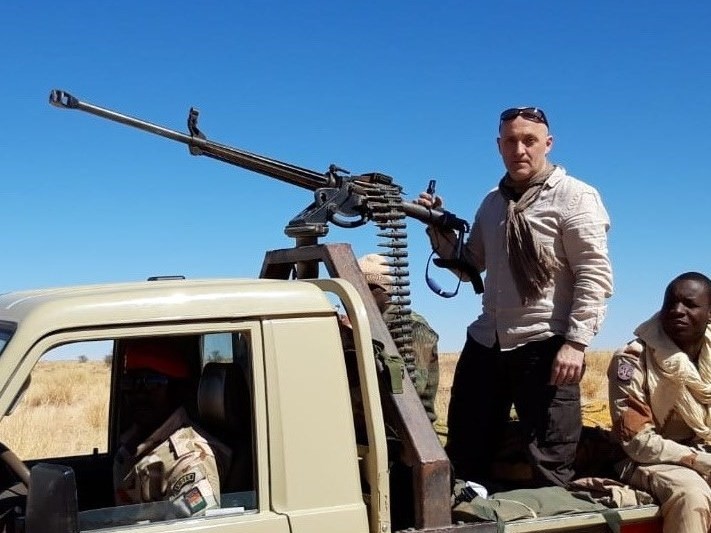 Horațiu Potra in Africa (HotNews.ro)
Horațiu Potra in Africa (HotNews.ro)
In West Africa and the Sahel
Potra later operated in Burkina Faso, where one of his men Iulian Gherguț, was abducted by Mokhtar Belmokhtar in 2015 while guarding a manganese mine. The mercenary was not released until 2023 after spending eight years as a prisoner shuttled between Mali and Burkina Faso (Libertatea [Bucharest], August 9, 2023; Libertatia [Bucharest], August 10, 2023). Potra’s company was supplying security at the time to mineral interests owned by Frank Timiș. Potra was also reported to have trained Chadian rebels (Taz [Berlin], January 9, 2023). By 2016, Potra was back in the CAR working as bodyguard to President Faustin Touadéra (Taz [Berlin], January 9, 2023).
Deployment in Nord-Kivu
Currently, Potras and his Romanians are engaged in active combat alongside the Forces Armées de la République Démocratique du Congo (FARDC) and UN peacekeepers against the eastern Congo’s M23 (Mouvement du 23 mars), a predominantly Congolese Tutsi anti-government militia operating in the province of Nord-Kivu with the support of Rwanda (Terrorism Monitor, July 26, 2012). Both the Nord-Kivu Tutsi and the Sud-Kivu Banyamulenge Tutsi suffer from ethnic discrimination and the threat of expulsion from the DRC due to widespread accusations of being “Rwandan foreigners” rather than natives of the Kivu region.
M23 made an earlier play for power over a decade ago under Rwandan Tutsi General Bosco “The Terminator” Ntaganda (jailed for 30 years by the International Criminal Court in 2019 for war crimes and crimes against humanity), but were defeated in 2013. M23 fighters fled across the DRC border to refuge in Uganda and Rwanda. The movement began to return to the DRC quietly in 2017 under military leader Brigadier General Sultani Emmanuel Makenga. A Congo-born member of the Mugogwe sub-group of the Tutsi, Makenga helped bring Laurent-Désiré Kabila to power in the DRC in 1997 before Tutsis were ordered to leave the Congo during a general expulsion of “foreign” troops in 1998 (New African, February 15, 2013; for Makenga, see AIS, June 2, 2025).
A reorganized M23 retook the offensive in eastern Congo in October 2021 after Kinshasa launched a campaign to force all armed groups in its eastern provinces to disarm and demobilize. In response to alleged Rwandan backing for the M23, Kinshasa revived its support for the Forces Démocratiques de Libération du Rwanda (FDLR), a Hutu-based Rwandan armed opposition movement promoting the genocidal ideology behind the 1994 Tutsi genocide in Rwanda (Le Monde, March 20; Great Lakes Eye [Kigali], December 28, 2022).
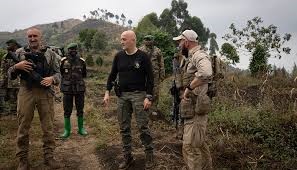 Potra and Romanian Mercenaries in the Congo (IJ4EU)
Potra and Romanian Mercenaries in the Congo (IJ4EU)
Under pressure from the rebels, DRC President Félix Antoine Tshisekedi Tshilombo declared in October 2022 that he would not give in to the “fashionable” trend of hiring mercenaries to combat rebellion in his country. Two months later, White mercenaries were spotted providing security around Goma airport, which was overrun and looted by M23 in 2012 (Great Lakes Eye [Kigali], January 19, 2023). These were the vanguard of Potra’s Romanian PMC, consisting originally of 400 fighters, reports indicate this number may have recently doubled (Great Lakes Eye [Kigali], March 21, 2023). Rwanda claims there are now 2,000 mercenaries from Eastern Europe in Nord-Kivu (New Times [Kigali], October 16, 2023). Potra was able to take advantage of the December 2022 lifting of a long-standing arms embargo on the DRC to provide a free flow of arms for the mercenaries, who are paid $5000 per month (Observator [Bucharest], February 9).
Armed White men in combat gear (but without insignia) were soon spotted in the Nord-Kivu city of Goma, where they were guarded at their Hotel Mbiza headquarters by FARDC troops (Taz [Berlin], January 9, 2023). The local habit of referring to the Romanians as “Russians” initially created many false reports of a Wagner presence in Goma and Nord-Kivu. Unlike Wagner’s connections to the Kremlin, Romanian authorities have made it clear there is no state involvement with Potra’s mercenary group (Observator [Bucharest], February 9).
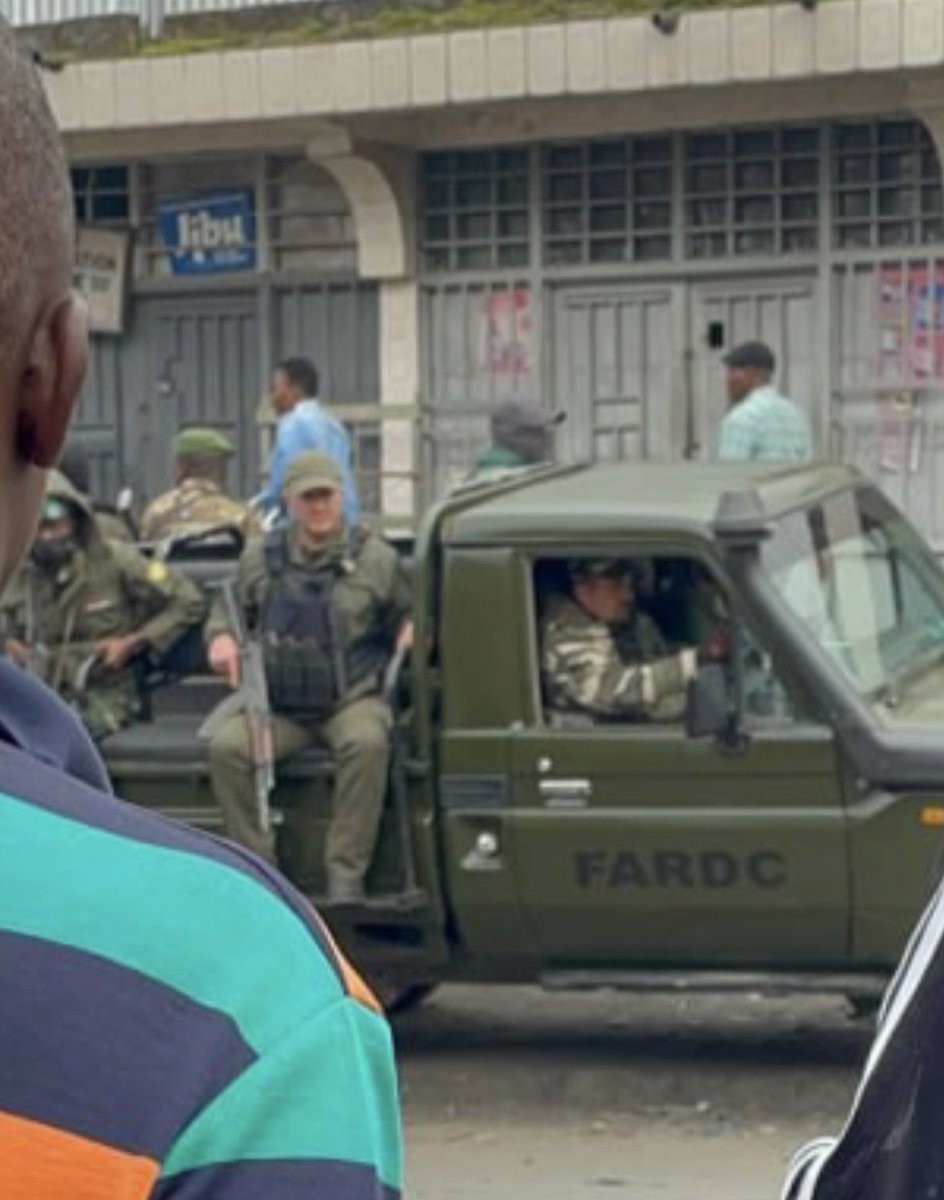 Romanian Mercenaries Using a FARDC Vehicle (Great Lakes Eye)
Romanian Mercenaries Using a FARDC Vehicle (Great Lakes Eye)
Corrupt, inefficient and undisciplined, FARDC is supported not only by the Hutu FDLR and European mercenaries, but also Burundian troops and the Wazalendo (Kiswahili – “patriots”), a coalition of Mayi Mayi militias and other pro-government armed groups formed in May 2023 (Africa Defense Forum, January 16). The Mayi Mayi are local Congolese militias ostensibly engaged in a struggle for indigenous rights, but better known for drug-fuelled rampages against villagers involving rape, looting and murder (see Terrorism Monitor, April 3, 2014).
The incompetence of FARDC forces Kinshasa to seek defenders abroad. The East African Community Regional Force (EACRF – Burundians, Ugandans, Kenyans and South Sudanese) deployed in Nord-Kivu in November 2022 during M23 advances, but withdrew its last troops in December 2023 after the DRC declined to renew its mandate (East African [Nairobi], December 21, 2023). Only months into their mission, EACRF faced threats in Goma from demonstrators who accused the force of failing to fight M23, though their mandate called for an offensive only as a last resort (Great Lakes Eye [Kigali], March 21, 2023; DRC News, May 16, 2023). EACRF’s Kenyan commander, General Jeff Nyaga, resigned in April 2023, complaining of intimidation and surveillance by “foreign mercenaries” (Kinshasa Times, April 28, 2023). Nyaga was accused by the Congolese of “peaceful cohabitation” with M23 and Rwandan troops in Kivu (Kinshasa Times, May 3, 2023). Dissatisfaction with the EACRF may have motivated Tshisekedi to intensify his recruitment of mercenaries.
About 1,000 Tanzanian, Malawian and South African troops belonging to the Southern African Development Community Mission in the Democratic Republic of Congo (SAMIDRC) began to arrive as replacements for EACRF in December 2023, but deployment has been slow and six men have already been lost to M23 mortar fire (DRC News, April 3; Kinshasa Times, April 9).
One Moldovan and two of Potra’s Romanian mercenaries, Victor Railean and Vasile Badea, were killed in a M23 ambush in February (DRC News, February 19). Four others were wounded when the Romanian unit remained under fire for ten hours while defending the city of Saké from a M23 offensive (Libertatea [Bucharest, February 9).
Potra’s fighters collaborate with Bulgarian PMC Agemira, led by French businessman Olivier Bazin, a.k.a. “Colonel Mario” (Great Lakes Eye [Kigali], January 19, 2023). Agemira maintains what is left of the DRC’s aging, mostly Soviet-era air force (Jeune Afrique, July 28, 2023). Georgian and Belarussian pilots are engaged to fly the DRC’s helicopters and fighter jets (Deutsche Welle, January 17, 2023; Bellingcat, June 26, 2017). A Georgian helicopter pilot was captured by M23 in 2017 (OC Media [Tbilisi], May 26, 2017).
Conclusion
Potra has recently taken an interest in Romanian politics, becoming president in February 2022 of the Mediaș chapter of the Alianței Pentru Patrie (APP – Alliance for the Fatherland), a nationalist Euroskeptic party. Some days later, Potra issued a video addressed to the Romanian political class. Holding a machete, Potra declared: “You are all traitors to the country who serve foreign interests…”. The mercenary chief also denounced Romania’s military support for Ukraine (Romania has been a NATO member since 2004): “What have the Russians done to us, how have they wronged us to be against them?” (Fanatik [Bucharest], April 14, 2023). Nonetheless, Potra has tried to exploit the difference between Russian mercenaries with ties to the Kremlin and his own Romanians. According to Potra, Western governments “should be very happy that a European company is [in the DRC] that is not Wagner” (Le Monde, March 20). The governments of the West have so far avoided displays of happiness over the deployment of Potra’s Romanian soldiers-of-fortune in the long-suffering Congo.
NOTES
- Jason K Stearns: Dancing in the Glory of Monsters: the collapse of Congo and the Great War of Africa. New York, 2011, p. 124.
- For more on European and African mercenaries in the CAR, see AIS Special Report, February 5, 2022.

